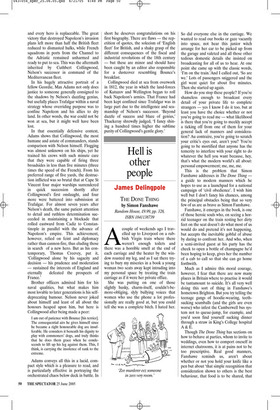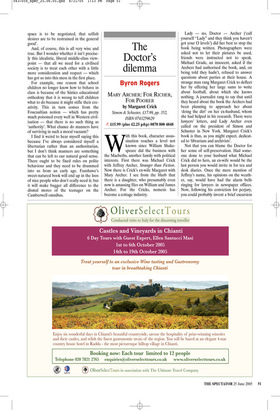Hell is other people
James Delingpole
THE DONE THING by Simon Fanshawe Random House, £9.99, pp. 328, ISBN 1841138739 Acouple of weekends ago I travelled up to Liverpool on a rubbish Virgin train where there weren’t enough toilets and there was a horrible smell at the end of each carriage and the heater by the window roasted my leg, and as I sat there trying to bury my miseries in a book a young woman two seats away kept intruding into my personal space by treating the train carriage as if it were her private office.
She was putting on one of those slightly husky, charm-itself, couldn’t-bemore-obliging, slyly bullying voices that women who use the phone a lot professionally are really good at, but you could tell she was a complete bitch. I hated her. So did everyone else in the carriage. We wanted to read our books or gaze vacantly into space, not hear this junior witch arrange for her car to be picked up from the garage and valeted and all those other tedious domestic details she insisted on broadcasting for all of us to hear. At one point she came up with the classic words, ‘I’m on the train.’And I called out, ‘So are we.’ Lots of passengers sniggered and the girl went quiet for about five minutes. Then she started up again.
How do you stop these people? If you’re shameless enough to broadcast every detail of your private life to complete strangers — yes I know I do it too, but at least you have the choice whether or not you’re going to read me — what likelihood is there that you’re going to meekly accept a ticking off from one of them for your general lack of manners and consideration? Au contraire, you’re going to scratch your critic’s eyes out, aren’t you? You’re going to be mortified that anyone has the temerity to interfere with your right to do whatever the hell you want because, hey, that’s what the modern world’s all about: personal empowerment; me, me, me.
This is the problem that Simon Fanshawe addresses in The Done Thing a guide to modern manners which he hopes to use as a launchpad for a national campaign of ‘civil obedience’. I wish him well but I don’t fancy his chances, among the principal obstacles being that so very few of us are as brave as Simon Fanshawe.
Fanshawe, it emerges in the book, is one of those heroic souls who, on seeing a horrid teenager on the train resting her dirty feet on the seat doesn’t do what most of us would do and pretend it’s not happening, but accepts the inevitable gobful of abuse by daring to confront her. And who, when a semi-invited guest at his party has the cheek to open a bottle of champagne he’d been hoping to keep, gives her the number of a cab to call so that she can go home forthwith.
Much as I admire this moral courage, however, I fear that there are now many places in Britain where to practise it would be tantamount to suicide. It’s all very well doing this sort of thing in Fanshawe’s hometown Brighton. But you try telling the teenage gangs of hoodie-wearing, teethsucking scumballs (and the girls are even worse) who infest the Camberwell bus system not to queue-jump, for example, and you’d soon find yourself sucking dinner through a straw in King’s College hospital A & E.
Though The Done Thing has sections on how to behave at parties, whom to invite to weddings, even how to comport oneself in internet chatrooms, it is at pains not to be too prescriptive. Real good manners, Fanshawe reminds us, aren’t about whether or not you hold your knife like a pen but about ‘that simple recognition that consideration shown to others is the best behaviour, that food is to be shared, that space is to be negotiated, that selfish desires are to be restrained in the general good’.
And, of course, this is all very wise and true. But I wonder whether it isn’t precisely this idealistic, liberal middle-class viewpoint — that all we need for a civilised society is to treat each other with a little more consideration and respect — which has got us into this mess in the first place.
For example, one reason that school children no longer know how to behave in class is because of the Sixties educational orthodoxy that it is wrong to tell children what to do because it might stifle their creativity. This in turn comes from the Foucaultian notion — which has pretty much poisoned every well in Western civilisation — that there is no such thing as ‘authority’. What chance do manners have of surviving in such a moral vacuum?
I find it weird to hear myself saying this because I’ve always considered myself a libertarian rather than an authoritarian, but I don’t think manners are something that can be left to our natural good sense. There ought to be fixed rules on polite behaviour and they need to be drummed into us from an early age. Fanshawe’s sweet-natured book will end up in the loos of nice people who don’t really need it; but it will make bugger all difference to the dismal mores of the teenager on the Camberwell omnibus.



































































 Previous page
Previous page